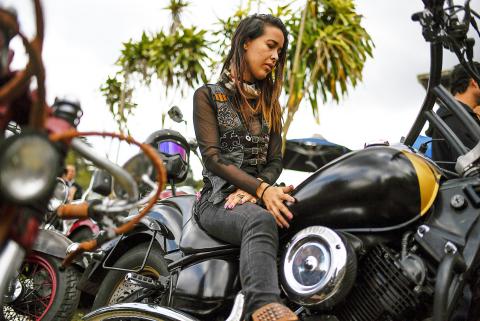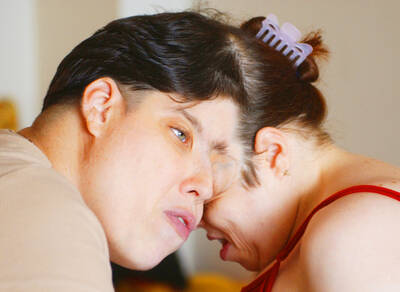When she rides alone around the streets of Caracas astride a Suzuki GS500, Ana Julia Mosquera tucks her long hair inside her helmet and wears baggy clothes.
“Sometimes I prefer to ride looking like a man, for safety,” she said.
Not just for safety, but also to avoid comments she and her fellow members of the Venezuelan all-female Ratgirls biker group suffer on a regular basis.

Photo: AFP
Mosquera has become immune to sexist quips like: “That’s a lot of bike for you.”
The 23 members of the Ratgirls are not looking to start a fight between the sexes, but they want respect from a biker world dominated by men.
“Crazy things always happen to us in the street,” said Mosquera, a 32-year-old audiovisual producer and Ratgirls president.
The Ratgirls, who were formed in 2014 after the mixed Rats biker club banned women, are identified by a black leather jacket with orange stripes, embroidered with the words: “Long life.”
Safety in numbers is crucial in a city such as Caracas, one of the most violent in the world.
Three times someone has tried to steal Mosquera’s bike. She even keeps its battery locked inside a cage.
Venezuela’s murder rate last year was 21 per 100,000 inhabitants, government data showed, but the Venezuelan Observatory non-governmental organization said the figure was actually 60: 10 times the global average.
The Ratgirls ride in groups to reduce the chance of being the victims of crime.
Several times they have been mistaken for notorious colectivos — civilians armed by Venezuelan President Nicolas Maduro’s regime who also ride bikes.
Oil-rich, but cash-strapped Venezuela is in the grip of five years of recession, and a chronic economic crisis that has left millions in poverty and shortfalls in basic necessities, such as food and medicine.
However, Maduro’s regime has maintained price controls on fuel — a great advantage for the Ratgirls, Mosquera said.
The Ratgirls are not just trying to show off, though, theirs is the kind of passion that leaves hands dirty.
Some, like Jennifer Rodriguez, are learning to fix their bikes themselves. She thinks nothing of tackling her Keeway Superlight 200 to mend a problem.
Half Spanish and half Venezuelan, Rodriguez joined the club just over a year ago.
“I started riding around with them and I stayed, now they’re my family,” said the single mother with a 10-year-old daughter.
Although the Rats biker club barred women from its club, the two groups still take part in events together, said Jose Gonzalez, vice president of the men’s club.
The 47-year-old, a professional photographer, acknowledges there is a “macho culture” in Venezuela that opposes women bikers.
“The Ratgirls have done better than other [male clubs], they ride more and have more activities than many [male] clubs,” Gonzalez said.
The Ratgirls “have a motto: no one is more than anyone if they don’t work harder than the other,” Mosquera said.
Maryelitza Sanchez, a 48-year-old mother of two, learned to ride a motorcycle out of necessity to get around town.
“The only thing I’d ridden before in my life was a bicycle,” the personal trainer said.
She had always been attracted to motorbikes, but her parents prevented her from riding one out of fear.
After Sanchez got married, her husband was also against the idea.
“We went around in a car,” she said.
Everything changed two years ago when she got divorced and needed to use the collapsed metro system in Caracas.
“Every day I went through a different issue in the metro. There was always a problem, I arrived late or not at all,” she said.
After falling twice from her Bera 150, she overcame her initial fears.
“It’s a unique feeling of freedom, of dominion, of control, of power. I feel powerful when I’m on the motorbike,” she said.

Republican US lawmakers on Friday criticized US President Joe Biden’s administration after sanctioned Chinese telecoms equipment giant Huawei unveiled a laptop this week powered by an Intel artificial intelligence (AI) chip. The US placed Huawei on a trade restriction list in 2019 for contravening Iran sanctions, part of a broader effort to hobble Beijing’s technological advances. Placement on the list means the company’s suppliers have to seek a special, difficult-to-obtain license before shipping to it. One such license, issued by then-US president Donald Trump’s administration, has allowed Intel to ship central processors to Huawei for use in laptops since 2020. China hardliners

Conjoined twins Lori and George Schappell, who pursued separate careers, interests and relationships during lives that defied medical expectations, died this month in Pennsylvania, funeral home officials said. They were 62. The twins, listed by Guinness World Records as the oldest living conjoined twins, died on April 7 at the Hospital of the University of Pennsylvania, obituaries posted by Leibensperger Funeral Homes of Hamburg said. The cause of death was not detailed. “When we were born, the doctors didn’t think we’d make 30, but we proved them wrong,” Lori said in an interview when they turned 50, the Philadelphia Inquirer reported. The

RAMPAGE: A Palestinian man was left dead after dozens of Israeli settlers searching for a missing 14-year-old boy stormed a village in the Israeli-occupied West Bank US President Joe Biden on Friday said he expected Iran to attack Israel “sooner, rather than later” and warned Tehran not to proceed. Asked by reporters about his message to Iran, Biden simply said: “Don’t,” underscoring Washington’s commitment to defend Israel. “We are devoted to the defense of Israel. We will support Israel. We will help defend Israel and Iran will not succeed,” he said. Biden said he would not divulge secure information, but said his expectation was that an attack could come “sooner, rather than later.” Israel braced on Friday for an attack by Iran or its proxies as warnings grew of

A prominent Christian leader has allegedly been stabbed at the altar during a Mass yesterday in southwest Sydney. Bishop Mar Mari Emmanuel was saying Mass at Christ The Good Shepherd Church in Wakeley just after 7pm when a man approached him at the altar and allegedly stabbed toward his head multiple times. A live stream of the Mass shows the congregation swarm forward toward Emmanuel before it was cut off. The church leader gained prominence during the COVID-19 pandemic, amassing a large online following, Officers attached to Fairfield City police area command attended a location on Welcome Street, Wakeley following reports a number